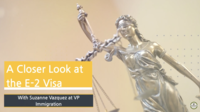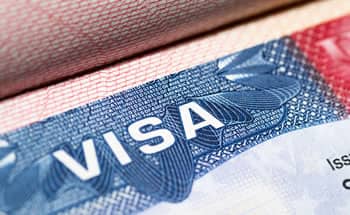
E-2 Visa Lawyers In Orlando Help Foreign Nationals With Their Visa Applications
The E2 Treaty Investor visa is based on Treaties which were created to enhance or facilitate economic and commercial interaction between the United States and the Treaty country. Many countries have these Treaties in place with the United States. Please contact us to find out if your home country has an E2 Treaty with the United States.
If your home country has an E2 Treaty with the United States, any individual or business who possesses the nationality of the Treaty country and seeks to develop, invest, and direct the operations of an enterprise in the United States, can apply for an E2 visa, subject to satisfying the statutory requirements, for permission to live and work in the United States.
The E2 visa is a Non-immigrant visa. It provides authorization for you to work and live in the United States with your immediate family for a temporary period. That temporary period can be for 2 to 5 years initially (which varies according to the treaty country), and, subject to the financial standing and economic impact of your business in the United States. The visa or status can be renewed indefinitely. The E2 visa application process can be complicated and confusing. We support our clients step by step through the process.
E-2 Visa Minimum Investment
The law does not specify a minimum dollar amount for an investor visa. That amount will vary depending on the type of activity you select (service vs. selling goods for example), whether you are creating a business from scratch or buying an existing business, the location of the business and with which U.S. Consulate you are applying for the visa.
E-2 Visa Requirements
To be eligible for an E2 visa, the investor must:
- Be a national of a country that maintains a treaty of commerce with the United States
The individual E2 visa investor must have citizenship to that country and need not necessarily reside in that country (the requirement varies depending on which U.S. Consulate the E2 visa is applied for). The nationality of the U.S. business will be determined by the nationality of its owners, individuals or entities, who must hold at least 50% or more of the company shares or interest. For a list of treaty countries, please visit the Department of State website.
- Have invested or actively be in the process of investing
The E2 visa investor must have invested enough funds in the enterprise such that it is close to the start of the business operations. For example, merely transferring funds into a business bank account will not qualify as an investment (but for a minimal amount for operating expenses)
- Invest a substantial amount in a U.S. enterprise
What is considered substantial varies greatly amongst U.S. Consulates as well as USCIS. The regulations do not set a minimum dollar figure, however the amount must be proportionate to the cost and nature of the business, as well as sufficient to ensure the success of the business.
For example, our law firm has successfully represented clients with E2 visa applications who were close to the start of their operations with investments of $50,000 or less. The U.S. consular or USCIS officers will look for payment of lease or rent, invoices, contracts, payment for services, stocks, purchase of material and equipment, etc…as proof of investment.
When applying the proportionality test by assessing the percentage of the investment in relation to the cost (value) of the business, the officers will deem that the lower the cost of the business, the higher the investment should be, as close as 100 percent as possible.
- Invest in a real and operating commercial enterprise
The investment for an E2 visa can consist of creating a new business, or buying an existing one, which could also be a franchise. Generally, a company such as a Limited Liability Company, Corporation, or Partnership will be created to operate the newly acquired business. In either case, the enterprise must be an actual business and for profit, generating income and creating employment for the U.S. workforce.
Enter the U.S. to develop and direct investments from the treaty country and develop and direct the operations of an enterprise
The investor, individual or foreign corporation, must own at least 50% of the shares of the company it wishes to develop and prove that control exists over the decisions of the company. If the ownership is greater than 50%, then generally the investor will meet the requirement. However, when the shares are divided between two individuals at 50/50 in a joint venture, the investor must prove equal managerial control over the company, i.e. negative control, allowing the investor to make decisions that are binding on the other party.
- The business must not be marginal
A business is marginal when it does not have the sufficient capacity to generate enough income to provide a minimal living for the treaty investor and his family.
The investor will generally have to prove that within 5 years of the commencement of the activity, the business will have the capacity to make a significant economic contribution. This means that it should create a minimum of 2 to 3 jobs for U.S. citizens or other qualified workers and generate sufficient income to provide for the treaty investor and his family.
- Be in possession of the funds which will be invested and the funds must be committed to the business
Being in possession of the funds to be invested will mean providing the legitimate source of funding for the amount invested, such as sale of real property, a business, gift, loan, inheritance or savings. The funds must generally transit through the investor before they are invested in the U.S. enterprise. Only funds which are placed at risk, where personal assets are involved, can be considered for investment purposes. This can include personal funds, other unencumbered assets or mortgage where the personal dwelling is used as collateral, or other personal liability.
The commitment of the funds to the business is generally proven through documentation of the investment already made or to be made, as well as asset purchase agreement containing a contingency clause. Note that the investor can purchase an existing business but still place the monies in an escrow account pending the issuance of the E2 visa or approval of change to E-2 status. That way, the investor is placing the funds at risk if business fortune reverses as the monies are disbursed to the seller once the E2 visa is issued.
- Must intend to depart the United States upon expiration of the visa
The investor does not need to prove intent to come to the United States for only a temporary period, or keep a residence abroad. The expression of an unequivocal intent to return when the E status expires is sufficient unless the investor states otherwise. Thus one must still be careful as to what is said during the interview process at a U.S. Consulate or if an immigrant petitions has been filed on his or her behalf prior to applying for the E2 visa or change of status.
E-2 Visa Renewal
The E-2 visa is approved for a temporary period that varies according to the treaty country. After this period, the visa can be renewed indefinitely, but there is no guarantee that the renewal will be approved.
Several criteria are looked at when renewing an E-2 visa, such as the number of employees you have, whether they are full-time or part-time, the salary they earn, whether you hire independent contractors, the profits generated which should be sufficient to support the investor and his family, and whether you are benefiting the U.S. economy. As a general rule, the investor must comply with the same requirements of the original E2 visa.
The adjudicating officer will look for several factors such as whether the company is profitable and creates employment for US workers. Contact Vazquez & Poudat in advance so we can form a clear strategy in furtherance of your E-2 visa renewal application. In addition, we do welcome contact during your E2 stay over the years you are here. We are always available to support you in answering questions that will undoubtedly arise during your American entrepreneurial adventure.
We frequently receive questions from clients about the E2 visa and its requirements. Is it better to create a business from scratch or buy an existing business? Can my children attend school in the United States? How will I know what school to choose for my children? Are my children going to be forced to leave the United States when they reach 21 years of age? What will the interview be like and what should I say? Please feel free to visit our E2 Visa frequently asked questions page for answers to these and many other questions that we put together in an effort to help you obtain as much information as possible.
Contact Our Board Certified Immigration Lawyers For Your E2 Visa Application
If you are considering an E2 Investment Visa, contact us today! We have a professional team dedicated to helping individuals with all of their immigration needs, including E2 visa applications. Suzanne Vazquez and Maud Poudat are both Board Certified as experts in Immigration and Nationality Law by the Florida Bar and have helped many clients over the years. Call our Immigration Law Firm today during office hours at (407) 674-6968 and we will be glad to help you. Our office is conveniently located in Orlando, in the heart of Central Florida, minutes away from Kissimmee.
5 Star Reviews
Board Certified Immigration attorneys Suzanne E. Vazquez and Maud Poudat focus on their clients' future, and have received numerous 5-star reviews from them. Below are some reviews from of our E-2 Visa clients. Please follow the link to read more!
-
★★★★★ Posted in Google by F.F.
Just amazing!!!!(Translated by Google): Professional and honest attorneys. We want to thank Suzanne Vazquez for her professionalism. We also greatly appreciate Daniela's attention, she is incredible. They helped us get the E-2 visa. When we had the first meeting with Suzanne, she was honest, so we appreciate it. Then, during the Visa process, Suzanne and Daniela always answered all our questions and helped us with everything we needed. We sincerely recommend Suzanne Vazquez and her team, Daniela Alvarado and Norelis Caldera, because they are excellent professionals.
(Original): Abogados profesionales y honestos. Queremos agradecer a Suzanne Vazquez por su profesionalismo. También apreciamos mucho la atención de Daniela, es increíble. Nos ayudaron a conseguir la visa E-2.Cuando tuvimos la primera reunión con Suzanne, ella fue honesta, así que lo agradecemos. Luego, durante el proceso de la Visa, Suzanne y Daniela siempre respondieron todas nuestras preguntas y nos ayudan con todo lo que necesitabamos. Recomendamos sinceramente a Suzanne Vazquez y su equipo, Daniela Alvarado y Norelis Caldera, porque son excelentes profesionales.








★★★★★ Posted in Google by A.S.
Don’t look further. You found the best and honest immigration attorney service. We contacted Vazguez and Poudat office in February, just three months before the end of our touristic Canadian visa. We were hoping to obtain an Investor’s visa to immigrate to US. Daniela gave us so many valuable advices, including the type of visa which we actually should apply to get our case approved on time! She was with us through every step of this journey. She paid lots of attention on details, was always in contact with us and prompt in docs preparation. We really felt her honest care. Very professional and straightforward approach of Daniela and Maud helped us to prepare the strong case, which was approved by immigration office.
Our family is truly grateful for your professionalism, honesty and care. I should say It’s rare to find! Defiantly recommend to contact Vazquez & Poudat attorney office.